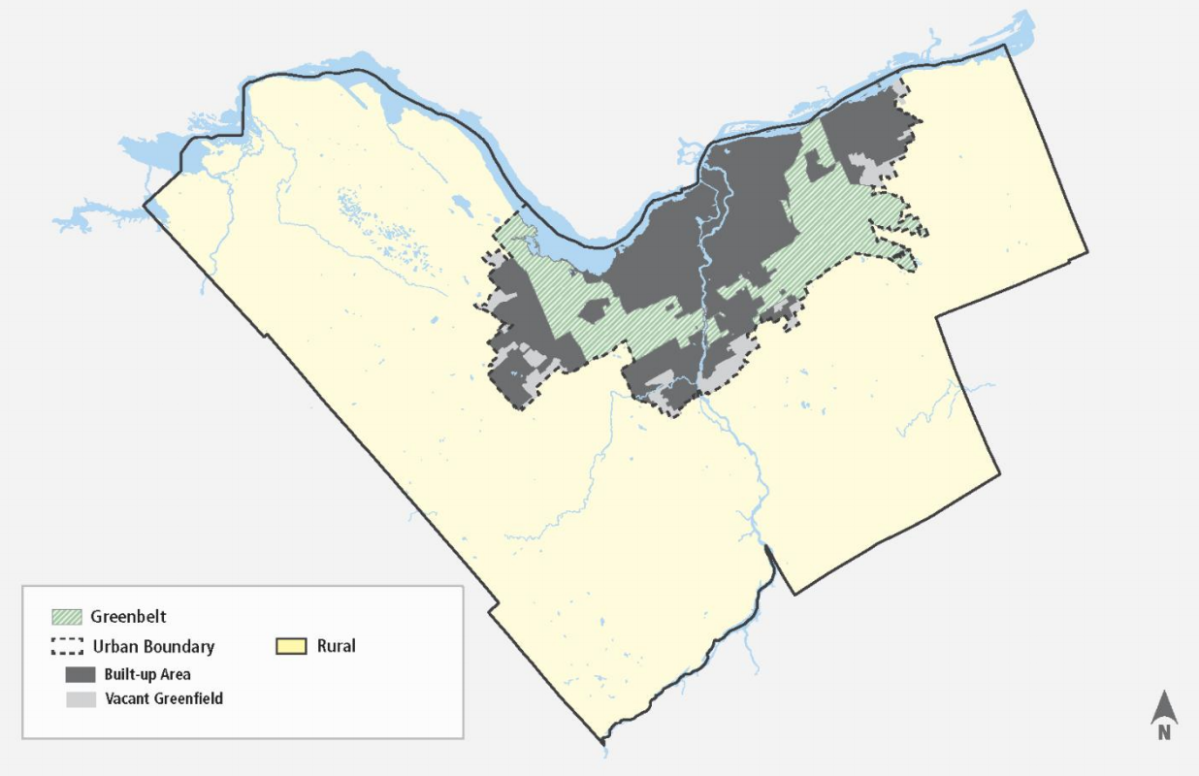Ottawa’s urban boundary is going to get bigger, but it won’t happen overnight.

Ottawa will grow by nearly 1,300 hectares to accommodate housing demands over the next 25 years. City council voted in favour of a staff report that concluded Ottawa could not meet provincial policy expectations without pushing development farther into the city’s rural lands.
City council approved the proposed urban boundary expansion with a vote of 15-6 following more than 100 virtual delegations and 27 hours of debate over the divisive issue, with councillors failing to come together by the end of Wednesday’s meeting.
The “nays” called for council to “hold the line” and fulfill Ottawa’s need to house an extra 400,000 residents over the next 25 years entirely through infill development.
This scenario would likely minimize the city’s greenhouse gas emissions by reducing traffic demands out to the suburbs while potentially reducing property taxes needed to fund infrastructure in new neighbourhoods.
The “yays,” in turn, approved of staff’s “balanced approach,” which would see the amount of buildable land in Ottawa increase by 1,350-1,650 hectares with an intensification rate hitting 60 per cent by 2046.

Some councillors argued this option would make housing cheaper in the long run as it makes developable land less scarce.
There was no definitive answer available as to which option would cost taxpayers or homebuyers less, as, citing a lack of resources, city staff did not cost out the models it created for either expanding or holding the urban boundary.
Much of the impetus to push out the urban boundary comes from a provincial policy statement that requires Ottawa to have 15 year’s worth of land supply with a suitable mix of housing options at all times.
River Ward Coun. Riley Brockington put forward a motion with the support of other urban councillors to fulfill Ottawa’s housing demands through intensification, but Mayor Jim Watson and planning committee chair Jan Harder — backed by the opinion of city staff — dismissed the proposal as “unrealistic.”
Ottawa’s general manager of economic development Stephen Willis said that if the “no expansion” route were endorsed by council, it would likely be denied or revised by Ontario’s minister of municipal affairs and housing as not complying with the provincial policy statement.
Staff reports pointed to the need for ground-oriented units to meet the demand of young families looking for homes in Ottawa, though some councillors took issue with the assumption that prospective homebuyers would not be satisfied with higher density housing options.

Watson argued that a scenario that involves 100-percent intensification would, in practice, face immense pushback from residents and their councillors, citing an approved four-storey development on Grenon Avenue from earlier in the same meeting that the ward’s councillor Theresa Kavanagh voted against.
“It may be good politics, but it’s not good planning,” Watson said of holding the urban boundary.
Kitchissippi Coun. Jeff Leiper disagreed with Watson, arguing that urban wards are not inherently anti-intensification, just against “bad development” where builders do not collaborate with councillors and neighbours.
“The urban wards are ready to take their share of intensification,” he said.
Capital Ward Coun. Shawn Menard was able to, at least temporarily, claw back some of the land proposed for expansion by passing a motion directing staff to conduct a more thorough study of employment lands required in the next 25 years.
The report had proposed an expansion of between 69 and 369 hectares for employment purposes.
Ottawa city council’s vote to approve an proposed expansion of the urban boundary:
Yays:
- Mayor Jim Watson
- Riley Brockington – River
- Jean Cloutier – Alta Vista
- George Darouze – Osgoode
- Laura Dudas – Innes
- Keith Egli – Knoxdale-Merivale
- Eli El-Chantiry – West Carleton-March
- Glen Gower – Stittsville
- Jan Harder – Barrhaven
- Allan Hubley – Kanata South
- Matthew Luloff – Orléans
- Carol Anne Meehan – Gloucester-South Nepean
- Scott Moffatt – Rideau-Goulbourn
- Jenna Sudds – Kanata North
- Tim Tierney – Beacon Hill-Cyrville
Nays:
- Mathieu Fleury – Rideau-Vanier
- Theresa Kavanagh – Bay
- Rawlson King – Rideau-Rockcliffe
- Jeff Leiper – Kitchissippi
- Catherine McKenney – Somerset
- Shawn Menard – Capital Ward
Absent:
- Rick Chiarelli – College
- Diane Deans – Gloucester-Southgate




Comments